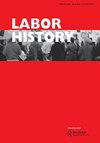战后香港本地劳工立法运动的兴起,1969-1981
IF 0.7
4区 管理学
Q1 HISTORY
引用次数: 0
摘要
摘要本文讲述了1969年至1981年,战后香港本地劳工立法议程的兴起。一百多年来,在英国政治变化的推动下,劳工问题的立法主要由殖民地办公室主导。由于缺乏工人参与政府的渠道,工会运动软弱而分裂,工会优先考虑外部政治议程而不是本地工人的福利,工人的声音对劳工立法根本没有影响。本文回顾了1969年至1981年间的三次立法运动,揭示了非政府组织而非工会如何动员工人制定本地劳工议程,为香港工人服务。这是研究香港劳工立法历史中缺失的一章,有助于理解战后香港自治工人运动的兴起。感谢冯国经先生(前香港工商会董事)、刘千石先生(前香港工商会董事)、梁宝林先生(前香港工商会雇员)和梁宝龙先生(前香港工商会志愿者)与我分享他们在香港工商会的经验。虽然我的研究主要依靠档案记录,但与档案记录的对话对我更了解香港商会的历史背景、信仰和活动方式,是非常宝贵的。本文中的任何错误都是我个人的责任。披露声明作者未报告潜在的利益冲突。自传体小品(二至三句话待发表;如提及某一本书,请提供出版商和出版年份)。20世纪30年代和战前40年代的劳工组织工作继续被控反帝国主义情绪,工人被动员起来支持反对日本入侵中国大陆的运动(Lu, Citation2019)。从战后到1960年代中期,香港的社会冲突被“香港土地上的中国政治”所融合,指的是国民党和共产党之间的政治竞争(Lui & Chiu, Citation1999)。参见矿工,N.(1981)。临48,脚注9。矿工们对比了King, A.(1972)进行的调查。《观塘政治文化》(香港中文大学社会研究中心)及其他调查,发表于G. Almond和S. Verba的《公民文化》(普林斯顿大学出版社,1963年,第185页),结果显示,在英国,78%的人认为他们可以影响政府政策,美国为77%,德国为62%,墨西哥为52%,意大利为51%。殖民地政府最初的建议是,工人必须在假期前的28天中工作不少于20天,或者在假期前连续工作不少于3天,并且工人是否在同一雇佣合同下没有限制。雇主协会的反对意见是,工人必须在假期前56天内为同一雇主工作至少40天,而在假期前连续工作不少于6天,才有资格享受带薪假期。参见Aiers (Citation1959)。除香港商会外,其他组织包括香港大学生总会、邻里谘询行动委员会、香港联合国联会和工人联盟等。作者简介:李班,香港中文大学历史系博士研究生。本文章由计算机程序翻译,如有差异,请以英文原文为准。
The rise of local labour legislation campaigns in post-war Hong Kong, 1969–1981
ABSTRACTThis article tells the story of the rise of local labour legislation agenda in post-war Hong Kong in the period between 1969 and 1981. For over a hundred years, the legislation on labour issues has been mainly led by the Colonial Office, which was driven by the changing politics in Britain. Given the lack of channels for workers to participate in the government, the weak and divided union movement, and the unions’ prioritization of external political agenda over local workers’ welfare, workers’ voices had no influence at all on labour legislation. Looking into three legislative campaigns between 1969 and 1981, this article reveals how non-governmental organizations, rather than labour unions, mobilized workers to develop the local labour agenda serving workers in Hong Kong. This is a missing chapter in the study of Hong Kong’s labour legislation history and contributes to the understanding of the rise of the autonomous labour movement in post-war Hong Kong.KEYWORDS: Labour legislationlabour lawsunionsHong Kong AcknowledgementsI would like to thank Mr. Raymond Fung (ex-director of HKCIC), Mr. Lau Chin Shek (ex-director of HKCIC), Mr. Leung Po Lam (ex-employee of HKCIC), and Mr. Leung Po Lung (ex-volunteer of HKCIC) for sharing their experiences in HKCIC with me. While I have relied mainly on archival records in my research, conversations with them have been invaluable in helping me have a much better understanding of the historical context, beliefs and campaign approaches of HKCIC. Any errors that remain in this article are my sole responsibility.Disclosure statementNo potential conflict of interest was reported by the author(s).Autobiographical sketch(two or three sentences to be published; if a book is mentioned, please provide publisher and year).Notes1. Labour organizing efforts in 1930s and pre-war 1940s continued to be charged with anti-imperialistic sentiments and workers were mobilized to support the campaigns against Japanese invasion in mainland China (Lu, Citation2019). In the post-war years up to mid-1960s, social conflicts in Hong Kong were fused by ‘Chinese politics on Hong Kong soil’, referring to the political rivalry between the Nationalists and the Communists (Lui & Chiu, Citation1999).2. See Miners, N. (1981). p.48, footnote no.9. Miners contrasted the survey conducted by King, A. (1972). The Political Culture of Kwun Tong (Social Research Centre, Chinese University of Hong Kong) with other surveys, published in G. Almond and S. Verba, The Civil Culture (Princeton University Press, 1963, p.185), which revealed that in Britain, 78 percent believed they could affect government policies, 77 percent in the United States, 62 percent in Germany, 52 percent in Mexico, and 51 percent in Italy.3. The original proposal from the colonial government was that workers should have worked for not less than 20 days out of the 28 days preceding the holiday, or not less than 3 consecutive days immediately preceding the holiday, with no restriction whether the worker was under the same employment contract. The counter proposal from the Employers’ Association was that to qualify for a paid holiday, workers should have worked at least 40 days for the same employer within 56 days preceding the holiday of which no less than 6 consecutive days immediately preceding the holiday. See Aiers (Citation1959).4. Apart from HKCIC, the other organisations included, for example, the College Student Association of Hong Kong, the Neighbourhood Advice-Action Council, the United Nations Association of Hongkong, and the Workers’ League.Additional informationNotes on contributorsBan LeeBan Lee is a PhD student in the Department of History in the Chinese University of Hong Kong.
求助全文
通过发布文献求助,成功后即可免费获取论文全文。
去求助
来源期刊

Labor History
Multiple-
CiteScore
1.00
自引率
28.60%
发文量
44
期刊介绍:
Labor History is the pre-eminent journal for historical scholarship on labor. It is thoroughly ecumenical in its approach and showcases the work of labor historians, industrial relations scholars, labor economists, political scientists, sociologists, social movement theorists, business scholars and all others who write about labor issues. Labor History is also committed to geographical and chronological breadth. It publishes work on labor in the US and all other areas of the world. It is concerned with questions of labor in every time period, from the eighteenth century to contemporary events. Labor History provides a forum for all labor scholars, thus helping to bind together a large but fragmented area of study. By embracing all disciplines, time frames and locales, Labor History is the flagship journal of the entire field. All research articles published in the journal have undergone rigorous peer review, based on initial editor screening and refereeing by at least two anonymous referees.
 求助内容:
求助内容: 应助结果提醒方式:
应助结果提醒方式:


